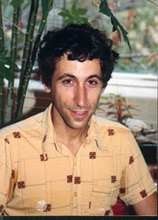
Photo via Flickr/jayo128
Washington University.
In his role as physics professor at Washington University, Dr. Jonathan Katz labors to explain universe through the study of its parts in motion. But when he's not in the classroom or in the laboratory, Katz's life is governed by far more worldly (and unscientific) beliefs.
Those beliefs include such statements as "the diversity movement is racist to its core" and declaring that he is "a homophobe, and proud." Both lines are found in essays on Katz's personal website, and over the years the professor's noxious views have created headaches for his employer — which can't fire him because of tenure rules — and outrage among students.
Now he's at it again. But this time, Katz's views have been rejected in a satisfyingly public fashion — with the prof getting owned by a first-year undergrad, no less, in the pages of the student newspaper.
Katz's latest tantrum involves the status of women in Washington University physics department. To Katz, a tenured professor since 1976, the fact that his department includes exactly zero women with tenure or tenure-track professorships is hardly a cause for concern, and certainly not a reflection of intentional discrimination. Instead, as he wrote in an April 3 op-ed published in the student newspaper Student Life, Katz suggests that the absence of women in physics is simply unexplainable and should be accepted as a basic fact of nature.
As proof, Katz argued that his wife faced no discrimination during her time in the Washington University physics department. (She also published her own op-ed stating the same point.) Katz concluded his piece by suggesting that women themselves are to blame for the imbalance, because women are "on average, less interested in or less talented in physics than men."
(For the record, Katz's flippant suggestion is flat-out-wrong. And if he tried to understand the position of actual female scientists working in the field — or at least spoke to a female scientist or two who are not also currently married to him — he might gain some greater insight.)
Enter Jen McLish. The Student Life opinions writer and Wash U freshman fired back at Katz last week with force.
McLish's April 13 column, "The case of the missing women: A physics department mystery," is worth reading in full — not only for its well-reasoned deconstruction of Katz's theories, but also because McLish dispenses with any lip service to academic respect in favor of cutting Katz down to size.
And the burns! By Newton's beard, the burns McLish unleashes! Here's how she concludes her opening paragraph.
According to Professor Katz, we may never know why there are so few women in the physics department. It’s one of life’s great unanswerable questions, like “what is the meaning of life?” and “how does Professor Katz still have a job?”
And it gets better from there: McLish saves her best jab for the very last sentence.
In the column, McLish notes that while some women in physics do feel valued and supported, the experience of one woman — Katz's wife — is hardly an argument that can stand on its own. When it comes to what has traditionally been considered the "hard sciences," or what's now referred to as STEM (science, technology, engineering and mathematics), it is not enough for institutions to throw up their hands at the status quo, or to beg innocence in the face of inequality. McLish writes:
If we want more women in STEM fields now, simply refraining from openly discouraging girls from pursuing math and science won’t be enough. Society already quietly discourages them from doing so. We have to actively encourage girls to go into STEM and give them the kind of support that their male peers receive every time they see an all-male engineering team or take a classes taught by only male professors. We need female professors because the reason there are few female physicists now is that there were fewer female physicists a generation ago.
In an interview with Riverfront Times, McLish explains that she wanted to offer a perspective to counter the empty points Katz was trying to present as common sense.
"I wanted people to know that his opinion wasn’t secretly what everyone was thinking. It's not reflective of the whole school," she says. "There are always going to be Katzes in the world. It’s incredibly frustrating and rage-inducing when they speak up about their ignorant beliefs. The important thing is to focus on the big picture."
She adds, "I was disappointed by Katz, but I’m more disappointed by the lack of response from the rest of physics department."
As McLish notes, the university's own physics students have been raising the alarm for months about their department's persistent gender imbalance, and those criticisms have been well-documented by Student Life reporters.
But some worry that the controversy surrounding Katz is giving Washington University a bad reputation. Last year, the department reportedly made three job offers to women, but none took the positions.
Some students and faculty worry that the publicity of the department's gender diversity struggles could be creating its own feedback loop, making the school appear uninviting to women scientists and potentially driving away prospective hires.
That possibility is doubly frustrating for those who trying to improve the department.
"Personally I feel my department is very welcoming and does not condone these types of actions," says Siera Stoen, a first-year physics graduate student. She wishes Katz could see that pursuing diversity isn't a liberal conspiracy to weaken the physics department. "There comes a time when you look at the department and think ‘How can I make this department better?' That’s not discriminating, that’s the reverse."
And while Katz gets by with sticking to science in the classroom, he's making things worse for the department by insisting the women-free status quo should remain unchallenged.
Stoen concedes that Katz is a "brilliant physicist," but he doesn't know what it's like have a professor tell him (as one once told Stoen) that he should give up on physics and take up stripping.
"It's frustrating because we get dubbed this horrible, non-inclusive environment when we are making further strides, and then we’re weighed down by everyone seeing Dr. Katz's actions as representative of our department," she says. "Any scientist will create a theory to try and explain a phenomenon, but the fact is, when it gets disproved, you have to accept it. I think where Dr. Katz is going wrong is that he’s not accepting anything but his own viewpoint."
For his part, Katz doesn't appear ready to broaden his viewpoint. Earlier this week, Student Life published his rebuttal to McLish, in which the professor doubled down on his sexism, writing, "There is no basis for rejecting the hypothesis that men’s and women’s minds, as well as their personalities, are intrinsically different."
But Katz has already proven himself obtuse beyond all reasonable measure. He doesn't see what's is front of his own eyes, let alone the experiences of others. When Katz's own son came out as gay, the father and professor did not reconsider his personal stance as a proud homophobe. Instead, in his son's own words, Katz told him to "deny who I am rather than to engage in an act so abhorrent as to love another man."
Maybe Katz's problem isn't simply his tendency to share wild conjecture on subjects he knows little about. Maybe he simply lacks a sense of human decency. If that's the case, it would be the latter failing that's most damaging.
That's not a conclusion based on peer-reviewed scientific studies, but that shouldn't bother Katz. He's already quite familiar with the evidence.
Follow Danny Wicentowski on Twitter at @D_Towski. E-mail the author at [email protected]






